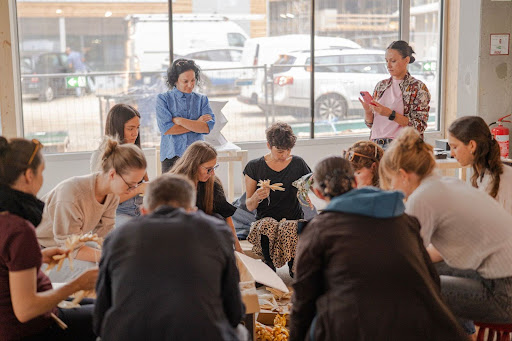Syllabus⇝
Interactive seminar with a Hybrid half-day international exchange session with SODA: Manchester University the School of Digital Arts.
The Collective Intelligence Seminar explores plural design ontologies and epistemologies through a program that combines talks, workshops, and a collaborative session with the School of Digital Arts at Manchester Metropolitan University, a partner in Fab Lab Barcelona's EU projects.
The seminar introduces students to key concepts such as design ontologies and epistemologies, the commons, design for the pluriverse, situated knowledge, decentralized collaboration, and their importance within the framework of collective intelligence and relevance in contemporary design practice. Sessions will feature practical examples from international design collectives like the Distributed Design Platform, One Army, and Precious Plastic, showcasing initiatives that democratize knowledge and resources to foster resiliency.
Participants will analyze these design communities through both global and local perspectives, exploring governance processes, digital tools, and platforms that enable collaborative, distributed design approaches enabled by collective intelligence. The seminar will also delve into recent advancements in Decentralized Autonomous Organizations (DAOs) and Decentralized Autonomous Communities (DACs) within the creative industries. Complimentary to these very human and mostly very digital approaches some non-human examples will be included to explore a more-than-human approach to collective intelligence.
A special highlight of the seminar is the opportunity for students to gain insights into ongoing EU projects and research led by Fab Lab Barcelona. One session will feature a digital collaboration with the School of Digital Arts at Manchester Metropolitan University, connecting participants with their local students and community cohort for an engaging exchange of ideas.
Learning Objectives⇝
Conceptual Understanding: - Students will explore the concepts of commons, DAOs and DACS within the creative industries context through inspirational and theoretical lectures and real-world examples. Speculative Workshop Participation: - Students will engage in a speculative workshop to gain deeper insights and guidance around the introduced concepts. - Teams split into international working groups will collaboratively explore a commons based models for a DAO/DAC applied with an example of a creative exhibition
Students will be able to explore EU Research's approach and technological application of the concepts with the Dafne + Platform: - Introduction to DAFNE+ platform's possibilities, learning the basic functions, with practical application in subsequent tasks such as the creation and uploading of the project into the platform.
Keywords: Commons based design communities, design for the pluriverse, collective design approaches
Schedule⇝
We suggest engaging in an average of four collective design interventions this term, but naturally it can change depending on the project, the evolution or the student’s personal circumstances. The number four is a guideline.
- Introduction to Collective Intelligence, including concepts such as Design for the Pluriverse, Situated Knowledge, Decentralized Collaboration and more. All concepts will be backed up with examples and references from the design research world.
- Practical exercise (as individuals and group) will include a exploration of creative governance models based on values, exploring the Distribtued Design values and how to identify your own values for your creative community.
- Introduction to the Commons, Harding vs. Ostrom, the interplace of Collective Intelligence, Commons, Design and the democratisation of resources.
- Practical exercise (in groups) will explore the themes.
- Collaborative session with SODA to explore DAO’s and DAC’s and a interactive session with the creative cohort in Manchester.
Methodological Strategies
- Workshops
- Lectures
- Gamification
- Peer learning
- vTeam-based learning
Deliverables⇝
- Each student will need to complete the independent Value reflection exercise in Miro (done during class).
- Each student will need to complete the collective practical exercise (Commons Forrest) in Miro (done during class).
- Each student will need to write a short paragraph after the seminar about their personal reflection and understanding of “collective intelligence”, new creative governance models, and commons-based design practices based on the insights gained during the class. This reflection should include insights into the students' perspective on how some of the concepts discussed during the seminar could be applied in their project or group exhibition and publication due end of the Master's. Additionally, the students will be asked to add real-life design and project examples that utilize some of the discussed concepts (researching those will happen during the seminar).
Grading Method⇝
| Percentage | Description |
|---|---|
| 50% | Participation (consisting of attendance and active participation in exercises and conversations) |
| 50% | Personal reflections (to be uploaded on their website) |
European Credit Transfer and Accumulation System (ECTS)
1 ECTS
Additional Resources⇝
Blockchain tools for creators. Cryptofunding digital commons by Karim Esry from Espacio Open
CC0 Studios exploring creative commons and open-source projects within the blockchain space.
re:publica 2023: AX Mina - The Magic of Pluralistic Futures Ax Mina’s talkk at re:publica 2023 discussing the magic of pluralistic futures, possibly exploring diverse and decentralized perspectives.
https://www.researchgate.net/publication/351078681_Decentralized_Autonomous_Organization Academic Paper by Primavera De Filippi and Samer Hassan
Design for the Pluriverse by Arturo Escobar
Faculty⇝
Jessica Guy is a designer and action researcher. Jessica’s work focuses on exploring participatory practices, community engagement and capacity-building activities in European research projects on a global and local scale. Jessica holds a Master degree in Design for Emergent Futures organised by the Institute for Advanced Architecture of Catalonia and Elisava Barcelona School of Design and Engineering, in collaboration with the Fab Lab Barcelona and Fab Academy. In the past, Jessica successfully graduated as an Industrial Designer (BA) at the Munich University for Applied Sciences and participated in the acceleration programme X-Futures by Fab Lab Barcelona. At Fab Lab Barcelona, Jessica is leading the global activities of the Creative Europe project Distributed Design Platform and co-leading the Erasmus+ Project Makeademy educational programme. Furthermore, they are the Make Works worldwide coordinator and lead of Make Works Catalonia. Jessica has contributed as a researcher to the European-funded projects Pop-Machina, CENTRINNO and REFLOW.

